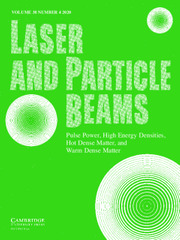Article contents
Electron-beam accelerator for pumping of a Xe2 lamp
Published online by Cambridge University Press: 05 January 2012
Abstract
A high-current electron-beam accelerator for pumping of a Xe2 lamp was developed. It is intended for injection of an electron beam into cylindrical gas cavity (diameter of 400 mm, length of 1600 mm, and the absolute pressure up to 3 bars). Two electron diodes in parallel are used in the accelerator. Each diode is connected to a linear transformer driver with vacuum insulation of a secondary turn. The next parameters of the accelerator have been obtained: diode voltage — 550–600 kV, diode current — 276–230 kA, current rise time — 160 ns, maximum power of the electron beam — 130 GW, pulse width on half maximum — 160 ns, electron beam energy at power level not less than half of maximum value — 20 kJ. The total energy of electrons, which pass through a 40 µm Ti foil into the Xe cell, is 8–9 kJ in the 150–160 ns pulse (full width at half maximum) mean specific power of energy input into gas cavity is about 330 kW/cm3. Design of the accelerator and test results are presented and discussed in this paper.
Keywords
- Type
- Research Article
- Information
- Copyright
- Copyright © Cambridge University Press 2011
References
REFERENCES
- 12
- Cited by


